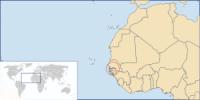|
|
|
The country is situated around the Gambia River, the nation's namesake, which flows through the country's centre and empties into the Atlantic Ocean. Its area is almost 10,500 km2 with an estimated population of 1,700,000. On 18 February 1965, Gambia gained independence from the United Kingdom and joined The Commonwealth. Banjul is Gambia's capital, but the largest conurbations are Serekunda and Brikama. Gambia shares historical roots with many other west African nations in the slave trade, which was the key factor in the placing and keeping of a colony on the Gambia River, first by the Portuguese and later by the British. Since gaining independence in 1965, Gambia has enjoyed relative political stability, with the exception of a brief period of military rule in 1994. An agriculturally fertile country, its economy is dominated by farming, fishing, and tourism. About a third of the population lives below the international poverty line of US$1.25 a day. |




 RSS
RSS